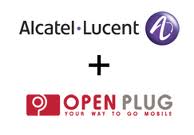 Alcatel-Lucent (Euronext Paris and NYSE: ALU) announced two initiatives to fuel the growth of applications that work across platforms and devices.
Alcatel-Lucent (Euronext Paris and NYSE: ALU) announced two initiatives to fuel the growth of applications that work across platforms and devices.
Effective immediately, OpenPlug Studio (formerly OpenPlug ELIPS Studio) will now be available to application developers free of charge. OpenPlug Studio is a development toolkit that allows developers to efficiently create native applications for smart phones, tablets and other web-connected devices from a single code base using well-known web development technologies such as JavaScript, ActionScript and XML. Developers can download OpenPlug Studio at http://developer.openplug.com
The company also launched a Certified OpenPlug Solutions Provider Program focused on application development and developer training. Initial members include Exuvis, Nexworld and On3. They will teach developers how to use the OpenPlug tools, while also building mobile applications for businesses that run on any platform or device and leverage service providers’ network-based APIs (application programming interfaces).
These new initiatives will make it easier for a new generation of applications to be developed and rolled out “at the speed of ideas” – a core commitment of Alcatel-Lucent in its support of the application developer community.
The tremendous growth in mobile applications is largely fueled by the consumer and enterprise adoption of smartphones and tablets. Industries such as transportation are looking to these devices to more efficiently mobilize their staffs and deliver an entirely new level of service. Media and entertainment industries are using the technology to extend the value of content subscriptions across as many platforms as possible – keeping paid content in play.
Alcatel-Lucent acquired OpenPlug in September 2010, one of several aggressive moves it has made to advance Alcatel-Lucent’s Application Enablement vision. Application Enablement combines the service provider’s trusted network capabilities with the speed and innovation of the Web to enable a new generation of richer services for consumers and business users. The OpenPlug tools are also incorporated into the company’s Open API Platform which enables service providers and enterprises to open up their networks and attract a community of application and content providers.
“One of the things we set out to do when we created the Open API Platform was address the entire API and app ecosystem,” said Laura Merling, senior vice president of Alcatel-Lucent’s Application Enablement Strategy and Platform. “Making OpenPlug Studio free puts one of the industry’s most powerful tools into the hands of more developers. And building a formal partner program further supports the need across all industries to provide the education and tools to meet the demands of the connected business.”
Developers can catch the new OpenPlug Solutions Provider Program members at several upcoming events:
• Exuvis and Alcatel-Lucent will present together at the International Classified Media Association conference on April 30, 2011, in Nice, France. Exuvis will detail how it used OpenPlug Studio to develop its Hebbes Immo classified ad publishing app.
• On3 will host a pre-conference workshop on May 24, 2011, at the Alcatel-Lucent-sponsored Glue Conference in Broomfield, Colorado. The workshop is open to all conference attendees and will explore the process of developing native cross-platform applications with OpenPlug Studio.
Partner Quotes:
Marc Muller, CEO at Nexworld: “Thanks to OpenPlug Studio, our customers will open their enterprise systems to new use cases enabled by smartphones and tablets. Nexworld will bring them the best architecture and software solutions to guarantee agility, efficiency and performance.”
Scott Guthman, Director of Sales and Marketing at On3: “On3 is proud to be the first North American Certified OpenPlug Solutions Provider. The OpenPlug Studio supports ActionScript which lets us leverage our expertise in Adobe Flex. This one tool allows for the deployment of native applications to the major mobile platforms: iOS, Android, Symbian, and Windows Mobile. Combining these tools for mobile software development increases productivity and will lower the cost of multiplatform development for us.”



